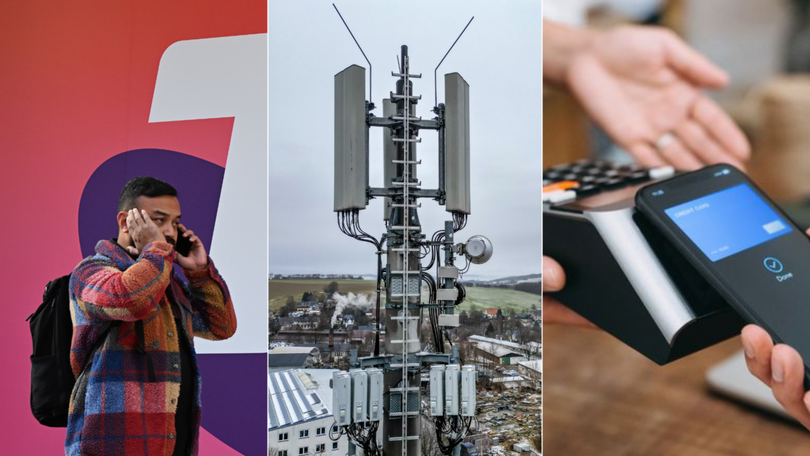Thousands of devices to stop working from Monday as 3G shutdown hits. Here’s everything you need to know
Tens of thousands of mobile phones will be obsolete on Monday.

Tens of thousands of phones will stop working and small businesses could be left in the lurch from Monday with the imminent shutdown of Australia’s 3G network.
Telstra and Optus are closing the ageing mobile network from October 28, having delayed their earlier deadlines to launch a public safety campaign.
A Senate inquiry in July confirmed almost 60,000 phones would not be able to connect to Triple-zero after the closure, while medical equipment, EFTPOS machines, alarms and farming technology could be cut off.
Sign up to The Nightly's newsletters.
Get the first look at the digital newspaper, curated daily stories and breaking headlines delivered to your inbox.
By continuing you agree to our Terms and Privacy Policy.“Industry has undertaken significant efforts to identify and contact potentially affected customers and share critical public information about the 3G switchover,” Communications Minister Michelle Rowland said.
Telstra and Optus have been running a joint social media campaign urging users to “check your tech”, as well as sending millions of alerts via SMS, email, recorded messages and letters.
Small businesses were earlier warned that preparing for the major telecommunications and technology transition involves more than just a phone upgrade.
Optus was also working closely with providers of personal medical devices, alarms and retail technology that might rely on 3G, executive Harvey Wright said.
“The good news is that as we get closer to the date we’ve seen those numbers reduce,” he told AAP.
Telstra had also been working with manufacturers of medical devices and reaching users through health publications and on screens in clinic waiting rooms, a spokesman said.
The 3G network closure is necessary to allow for the expansion of 4G and 5G services, he said.
“The time is right for us to close it so we can focus on investing in future-proofing our network to meet customer demand rather than in maintaining old technology that it’s increasingly hard to source parts for.”
A 12-day checklist was released to ensure a long list of important 3G-linked technology and equipment is not disconnected at the October 28 cut off.
“I fear many small, family and farming businesses are unaware of the scope of this event and the possible business-harming disconnection and technology dysfunction they may face,” Australian Small Business and Family Enterprise Ombudsman Bruce Billson said on Wednesday.
“This change is about far more than upgrading an old 3G phone.”
Billson said telecommunications companies and technology manufacturers and suppliers could do more to raise awareness about the impacts on their products — and warned businesses to take care “so you’re not a 3G casualty”.
A number of “vital” technologies run on a wireless communications link back to a base, service hub, control centre or panel.
Unless the device is upgraded, that communications link will stop working when the 3G service is turned off.
Fire alarms, remote sensors, medical monitors and sensors, tap-to-pay pads, EFTPOS terminals, security systems and cameras, elevator telephones, are just some of the technologies that can run on this link.
“Quite understandably, many of us focus on what the piece of kit actually does and the time-saving or technology-enhancing way it allows us to get on with business,” Billson said.
“It would be terrible if the first time you learn it runs on 3G is when it shuts down, and that might be critical to your business operations.”
4G devices can also run on 3G, and those purchased overseas are particularly at risk of being affected by the network closure.
Australia has been preparing to shut off the network since 2019.
TPG Telecom/Vodafone has already switched off its 3G network, while Telstra and Optus will switch off their 3G networks from October 28, 2024.
The Department of Infrastructure, Transport, Regional Development, Communications and the Arts said: “Service providers are making efforts to advise customers with devices that may be impacted.”
But Billson said companies are not doing enough to identify anyone who might unknowingly be using 3G products, to explain the wide-ranging effects and options for upgrade or replacement — with the onus largely remaining on consumers.
“Don’t risk being caught out. Please, check the functionality of your technology so you’re not a 3G casualty,” he said.
Checklist to avoid being a ‘3G casualty’
The Ombudsman has revealed a checklist to ensure small businesses are not unexpectedly affected by the 3G network closure:
With 12 days to shutdown, time for small business to check older-style EFTPOS terminals;
With 11 days to shutdown, check tap-to-pay pads at carpark exits and on vending machines;
With 10 days to shutdown, check medical monitors and sensors;
With 9 days to shutdown, check security systems and cameras;
With 8 days to shutdown, check asset tracking tools;
With 7 days to shutdown, check water and environmental monitors;
With 6 days to shutdown, check hand-held pads and tablets;
With 5 days to shutdown, remember some 4G devices also run on 3G;
With 4 days to shutdown, check telephones in elevators;
With 3 days to shutdown, check the modem on your tractor;
With 2 days to shutdown, check fire alarms;
With 1 day to shutdown, check remote sensors will still close the farm gate.
- with AAP
Originally published on 7NEWS
